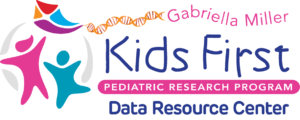CHOP-Led Gabriella Miller Kids First Data Resource Center Launches New NIH-Funded Childhood Disease Research Portal

Researchers, clinicians and families now have access to a powerful, open-source and cloud-based data resource to share important information about childhood diseases, including pediatric cancer and birth defects, thanks to a collaborative effort led by the Center for Data Driven Discovery in Biomedicine(D3b) at Children’s Hospital of Philadelphia (CHOP).
Today, the Gabriella Miller Kids First Data Resource Center (DRC), a collaborative effort supported by the NIH Common Fund, announced the launch of its new Data Resource Portal to help accelerate the worldwide discovery of precision-based treatments for pediatric disorders. Led by CHOP’s D3b, DRC partners include the hospital’s Department of Biomedical and Health Informatics (DBHi), Children’s National Health System, Ontario Institute for Cancer Research, Center for Data Intensive Science at the University of Chicago, Oregon Health and Science University and Seven Bridges.
“As a leader of the Kids First DRC, Children’s Hospital of Philadelphia is committed to accelerating breakthroughs for children all over the world and across a wide spectrum of diseases. The Kids First Data Resource Portal is designed to fully engage families as partners, and the resulting tool will help to break down silos, foster collaborations and harness the unique power of genetic data,” said Madeline Bell, President and CEO of Children’s Hospital of Philadelphia.
The Kids First Data Resource Portal provides access to newly released, large-scale NIH-sponsored and consortia-based pediatric genomic and clinical disease data, and empowers accelerated discovery efforts by enabling collaborative cloud-based analyses across institutions and researchers around the globe within an NIH-Trusted Partner and security compliant environment. Data from approximately 8,000 DNA and RNA samples from children affected with cancer or structural birth defects and their families will be ready for analysis with the launch of the portal and are expected to grow to more than 30,000 over the next few years. The Kids First Data Resource Portal will be one of the largest collections of integrated genomic and clinical data for these childhood diseases, which previously were studied largely in isolation. The portal also provides rich resources for the patient, medical and research communities to partner, learn and interact with the Kids First DRC, highlighting the importance of collaboration and data sharing across institutions and between disease communities.
N. Scott Adzick, MD, Surgeon-in-Chief of Children’s Hospital of Philadelphia and Director of the Center for Fetal Diagnosis and Treatment at CHOP, is enthusiastic about the potential of improving outcomes, stating, “Major advancements in the developmental biology of structural birth defects and cancer are now within reach because of the centralization of huge amounts of genomic data that investigators can easily access, share, analyze and re-analyze in the DRC portal. We are thrilled that the Division of Neurosurgery at CHOP is a vanguard of big data and precision medicine on behalf of children.”
The portal will include data from both NIH-sponsored research cohorts and newly-released, independent consortia-led efforts, including one of the largest pediatric brain tumor genomic and clinical datasets provided by the Children’s Brain Tumor Network (CBTN) and the Pacific Pediatric Neuro-Oncology Consortium (PNOC).
“This portal fills a crucial need, providing researchers with easy access to genomic, clinical and phenotypic data from a variety of childhood cancers and structural birth defects that would be extremely difficult to find elsewhere,” said James Coulombe, PhD, of the Developmental Biology and Structural Variation Branch at NIH’s Eunice Kennedy ShriverNational Institute of Child Health and Human Development. “We look to the database to spur discoveries that improve the health of children with these cancers and conditions.”
Additional portal features support collaboration and enable investigators to securely access Kids First datasets through the NIH’s eRA Commons and their database of Genotypes and Phenotypes (dbGaP) authorizations. The portal’s cloud-based, scalable computing is made possible through CAVATICA, a data-analytic workspace platform that allows researchers to rapidly access large-scale data and perform integrative and collaborative analyses without time-consuming downloads and costly local storage.
“The DRC’s Kids First research portal represents a data-driven discovery milestone for the implementation of tools and resources for performing biomedical research and for doing science collaboratively in entirely new and unprecedented ways in the hopes of accelerating discovery and clinical translation for each and every child suffering from cancer or a structural birth defect around the globe,” said Adam Resnick, PhD, lead PI of the Kids First DRC and Director of the D3b at the Children’s Hospital of Philadelphia’s Division of Neurosurgery.
Within the National Institutes of Health (NIH), the Gabriella Miller Kids First Pediatric Research program is a trans-NIH effort primarily led by the Eunice Kennedy ShriverNational Institute of Child Health and Human Development (NICHD), the National Cancer Institute (NCI), the National Human Genome Research Institute (NHGRI) and the National Heart, Lung and Blood Institute (NHLBI), in partnership with the Office of the NIH Director.
About the Gabriella Miller Kids First Data Resource Center
The Gabriella Miller Kids First Data Resource Center (DRC) is a collaborative pediatric research effort, created to accelerate data-driven discoveries and the development of novel precision-based approaches for children diagnosed with cancer and/or a structural birth defect using large genomic datasets. The DRC is supported by the NIH Common Fund grant U2CHL138346. For more information about the Kids First DRC, visit https://kidsfirstdrc.org.
About the Center for Data Driven Discovery in Biomedicine (D3b) at Children’s Hospital of Philadelphia
The Center for Data Driven Discovery in Biomedicine (D3b) at Children’s Hospital of Philadelphia was created in January of 2016 as a transformative healthcare discovery ecosystem to provide personalized care for children through collaborative, data-driven science. D3b’s multidisciplinary team brings together experts in the fields of basic science, precision medicine, bioinformatics and genomic research to de-silo research efforts and provide breakthroughs for every child, every time, everywhere. To learn more about The Center for Data Driven Discovery in Biomedicine, visit https://d3b.center/.
Contacts: Bobby Moulder, Kids First Data Resource Center, (267) 425-0248, moulderr@email.chop.edu
Ashley Moore, Children’s Hospital of Philadelphia, (267) 426-6071, Moorea1@email.chop.edu
SOURCE Children’s Hospital of Philadelphia
